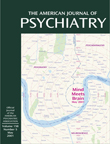A Systematic Investigation of 16 Cases of Neonaticide
Abstract
OBJECTIVE: Neonaticide, or infant murder on the day of birth, is often preceded by denial of pregnancy. The preponderance of case reports of neonaticide describes a pattern of pregnancy denial, dissociation, and ego disorganization. The author systematically investigated the clinical characteristics of 16 women charged with homicide in the United States after alleged neonaticides. METHOD: The women received a psychiatric evaluation and were administered the Dissociative Experiences Scale. RESULTS: Nearly all of the women reported similar precipitants and symptoms, including depersonalization, dissociative hallucinations, and intermittent amnesia at delivery. CONCLUSIONS: The characteristics of the women in the study were similar to those reported in the literature on neonaticide. The existence of this common pattern suggests that treatment strategies can be designed for women at risk for neonaticide.



